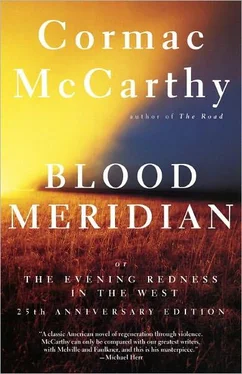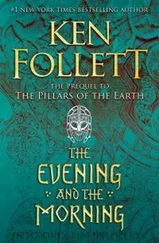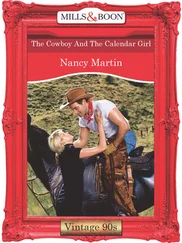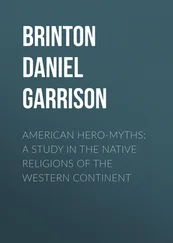Brown studied the judge. You’re crazy Holden. Crazy at last.
The judge smiled.
Might does not make right, said Irving. The man that wins in some combat is not vindicated morally.
Moral law is an invention of mankind for the disenfranchisement of the powerful in favor of the weak. Historical law subverts it at every turn. A moral view can never be proven right or wrong by any ultimate test. A man falling dead in a duel is not thought thereby to be proven in error as to his views. His very involvement in such a trial gives evidence of a new and broader view. The willingness of the principals to forgo further argument as the triviality which it in fact is and to petition directly the chambers of the historical absolute clearly indicates of how little moment are the opinions and of what great moment the divergences thereof. For the argument is indeed trivial, but not so the separate wills thereby made manifest. Man’s vanity may well approach the infinite in capacity but his knowledge remains imperfect and howevermuch he comes to value his judgements ultimately he must submit them before a higher court. Here there can be no special pleading. Here are considerations of equity and rectitude and moral right rendered void and without warrant and here are the views of the litigants despised. Decisions of life and death, of what shall be and what shall not, beggar all question of right. In elections of these magnitudes are all lesser ones subsumed, moral, spiritual, natural.
The judge searched out the circle for disputants. But what says the priest? he said.
Tobin looked up. The priest does not say.
The priest does not say, said the judge. Nihil dicit. But the priest has said. For the priest has put by the robes of his craft and taken up the tools of that higher calling which all men honor. The priest also would be no godserver but a god himself.
Tobin shook his head. You’ve a blasphemous tongue, Holden. And in truth I was never a priest but only a novitiate to the order.
Journeyman priest or apprentice priest, said the judge. Men of god and men of war have strange affinities.
I’ll not secondsay you in your notions, said Tobin. Dont ask it.
Ah Priest, said the judge. What could I ask of you that you’ve not already given?
* * *
On the day following they crossed the malpais afoot, leading the horses upon a lakebed of lava all cracked and reddish black like a pan of dried blood, threading those badlands of dark amber glass like the remnants of some dim legion scrabbling up out of a land accursed, shouldering the little cart over the rifts and ledges, the idiot clinging to the bars and calling hoarsely after the sun like some queer unruly god abducted from a race of degenerates. They crossed a cinderland of caked slurry and volcanic ash imponderable as the burnedout floor of hell and they climbed up through a low range of barren granite hills to a stark promontory where the judge, triangulating from known points of landscape, reckoned anew their course. A gravel flat stretched away to the horizon. Far to the south beyond the black volcanic hills lay a lone albino ridge, sand or gypsum, like the back of some pale seabeast surfaced among the dark archipelagos. They went on. In a day’s ride they reached the stone tanks and the water they sought and they drank and bailed water down from the higher tanks to the dry ones below for the horses.
At all desert watering places there are bones but the judge that evening carried to the fire one such as none there had ever seen before, a great femur from some beast long extinct that he’d found weathered out of a bluff and that he now sat measuring with the tailor’s tape he carried and sketching into his log. All in that company had heard the judge on paleontology save for the new recruits and they sat watching and putting to him such queries as they could conceive of. He answered them with care, amplifying their own questions for them, as if they might be apprentice scholars. They nodded dully and reached to touch that pillar of stained and petrified bone, perhaps to sense with their fingers the temporal immensities of which the judge spoke. The keeper led the imbecile down from its cage and tethered it by the fire with a braided horsehair rope that it could not chew through and it stood leaning in its collar with its hands outheld as if it yearned for the flames. Glanton’s dog rose and sat watching it and the idiot swayed and drooled with its dull eyes falsely brightened by the fire. The judge had been holding the femur upright in order to better illustrate its analogies to the prevalent bones of the country about and he let it fall in the sand and closed his book.
There is no mystery to it, he said.
The recruits blinked dully.
Your heart’s desire is to be told some mystery. The mystery is that there is no mystery.
He rose and moved away into the darkness beyond the fire. Aye, said the expriest watching, his pipe cold in his teeth. And no mystery. As if he were no mystery himself, the bloody old hoodwinker.
* * *
Three days later they reached the Colorado. They stood at the edge of the river watching the roiled and claycolored waters coming down in a flat and steady seething out of the desert. Two cranes rose from the shore and flapped away and the horses and mules led down the bank ventured uncertainly into the eddying shoals and stood drinking and looking up with their muzzles dripping at the passing current and the shore beyond.
Upriver they encountered in camp the remnants of a wagon train laid waste by cholera. The survivors moved among their noonday cookfires or stared hollowly at the ragged dragoons riding up out of the willows. Their chattels were scattered about over the sand and the wretched estates of the deceased stood separate to be parceled out among them. There were in the camp a number of Yuma indians. The men wore their hair hacked to length with knives or plastered up in wigs of mud and they shambled about with heavy clubs dangling in their hands. Both they and the women were tattooed of face and the women were naked save for skirts of willowbark woven into string and many of them were lovely and many more bore the marks of syphilis.
Glanton moved through this balesome depot with his dog at heel and his rifle in his hand. The Yumas were swimming the few sorry mules left to the party across the river and he stood on the bank and watched them. Downriver they’d drowned one of the animals and towed it ashore to be butchered. An old man in a shacto coat and a long beard sat with his boots at his side and his feet in the river.
Where’s your all’s horses? said Glanton.
We ate them.
Glanton studied the river.
How do you aim to cross?
On the ferry.
He looked crossriver to where the old man gestured. What does he get to cross ye? he said.
Dollar a head.
Glanton turned and studied the pilgrims on the beach. The dog was drinking from the river and he said something to it and it came up and sat by his knee.
The ferryboat put out from the far bank and crossed to a landing upstream where there was a deadman built of driftlogs. The boat was contrived from a pair of old wagonboxes fitted together and caulked with pitch. A group of people had shouldered up their dunnage and stood waiting. Glanton turned and went up the bank to get his horse.
The ferryman was a doctor from New York state named Lincoln. He was supervising the loading, the travelers stepping aboard and squatting along the rails of the scow with their parcels and looking out uncertainly at the broad water. A half-mastiff dog sat on the bank watching. At Glanton’s approach it stood bristling. The doctor turned and shaded his eyes with his hand and Glanton introduced himself. They shook hands. A pleasure, Captain Glanton. I am at your service.
Читать дальше












